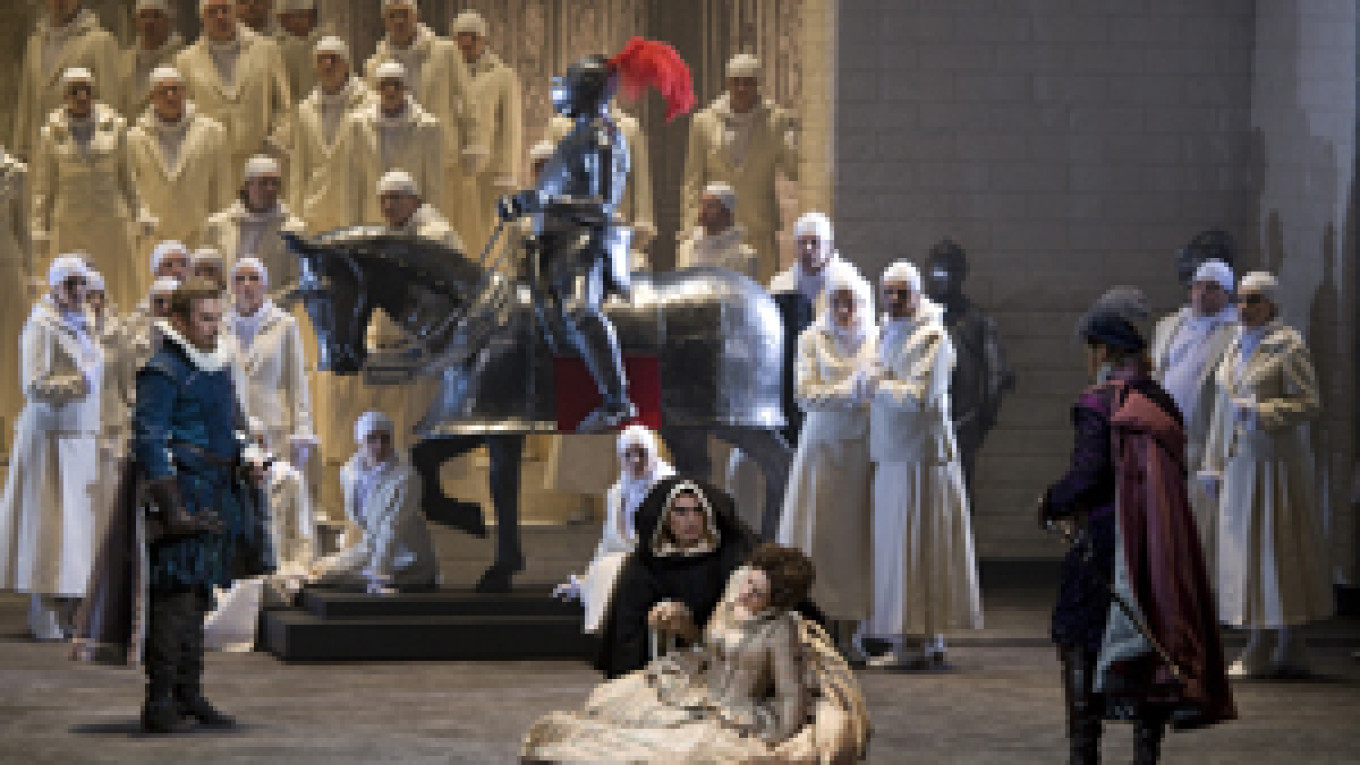"Lucia" stands or falls with the soprano cast in its title role. Luckily, the Stanislavsky and Nemirovich-Danchenko has just the singer the role requires, in the person of its sparkling coloratura from Abkhazia, Khibla Gerzmava. Gerzmava sailed beautifully through the first two acts and displayed, if not complete mastery, at least promise of great things to come in the long and fiendishly difficult Mad Scene of the third. To really succeed, "Lucia" also needs a smooth-voiced, ardent-sounding lyric tenor for role of Edgardo, which the theater provided as well. Its Edgardo, Alexei Dolgov, seems to go from strength to strength in the Italian repertoire, and never, to my experience, has he sounded more like a true Italian tenor of quality than he did in the new "Lucia." Unfortunately, at least at the production's second performance, the theater could boast neither a baritone nor a bass with any perceptible mastery of the vocal art of bel canto.
Given a first-rate Lucia and Edgardo, "Lucia di Lammermoor" can withstand an indifferently staged production and has done so many times since its premiere in 1835. But nothing at all indifferent can be found in the staging at the Stanislavsky and Nemirovich-Danchenko.
Unlike so many of his counterparts who come to opera from success in spoken drama, director Adolf Shapiro seems clearly to understand the difference between the two forms of theater, which is that in opera, unlike spoken drama, the action must follow the music.
Moreover, both Shapiro and his set designer, Andris Freibergs, seem to have taken a stance toward opera much like that of minimalist Robert Wilson, whose staging of Giacomo Puccini's "Madame Butterfly" is one of the rare delights in the Bolshoi Theater's operatic repertoire. Their clear delineation of both action and setting and their refusal to clutter the stage with a welter of objects and gimmicks are clearly akin to what Wilson demands. As a result, nothing stands between the audience and its ability to perceive what is most important of all in opera, the music of the composer's score.
Since abandoning his distinguished career as a pianist some two years ago, Mikhail Pletnev has devoted himself full-time to the orchestral podium. In the process, he has extended his conducting to include opera. Leading "Carmen" last week at Tchaikovsky Hall, he proved just as adept in his first encounter with the opera of a non-Russian composer as he had previously shown himself to be with operas of Sergei Rachmaninov, Pyotr Tchaikovsky and Nikolai Rimsky-Korsakov. His spirited account of Bizet's score stood head and shoulders above any that have appeared in Moscow during the past two decades.
On hand for the performance was a near-flawless cast of singers, including a Carmen and Micaela of French origin who provided an object lesson in authentic style and diction. Accustomed to hearing the sumptuous sounds of Russian mezzo-sopranos in the title role, some in the audience seemed dismayed by the relatively lightweight voice of Beatrice Uria-Monzon. Yet hers was precisely the kind of voice for which the role was written. Natalie Manfrino brought an appropriately clear and steady soprano to the music of Micaela.
The only jarring note of the evening came in the sometimes disfiguring cuts made in the music of all four acts. Most notably missing was the violent encounter in the third act between Don Jose and the toreador Escamillo, which deprived the latter, excellently sung by Italian bass-baritone Simone Alberghini, of nearly half his music. Surely, with a performance of such high quality, the audience would gladly have remained for another 20 minutes or so to hear both that and the rest of what went missing.
"Lucia di Lammermoor" next plays March 7 and 11 at 7 p.m. at the Stanislavsky and Nemirovich-Danchenko Musical Theater, located at 17 Bolshaya Dmitrovka. Metro Chekhovskaya, Tverskaya. Tel. 629-8388. www.stanmus.ru
A Message from The Moscow Times:
Dear readers,
We are facing unprecedented challenges. Russia's Prosecutor General's Office has designated The Moscow Times as an "undesirable" organization, criminalizing our work and putting our staff at risk of prosecution. This follows our earlier unjust labeling as a "foreign agent."
These actions are direct attempts to silence independent journalism in Russia. The authorities claim our work "discredits the decisions of the Russian leadership." We see things differently: we strive to provide accurate, unbiased reporting on Russia.
We, the journalists of The Moscow Times, refuse to be silenced. But to continue our work, we need your help.
Your support, no matter how small, makes a world of difference. If you can, please support us monthly starting from just $2. It's quick to set up, and every contribution makes a significant impact.
By supporting The Moscow Times, you're defending open, independent journalism in the face of repression. Thank you for standing with us.
Remind me later.


